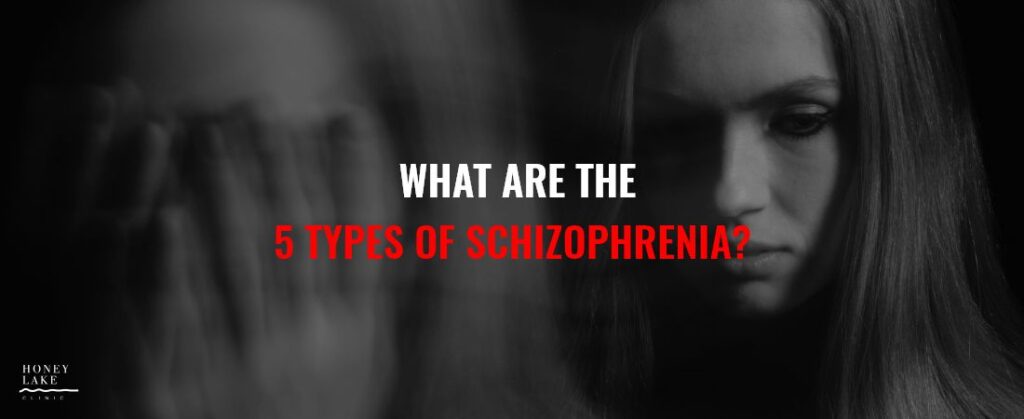What Are The 5 Types of Schizophrenia?
Schizophrenia is a term for a disorganized mind, and that’s a very good definition of what those suffering from this mental illness experience—fragmented cognitive abilities and thought processes.
Mental health disorders like Schizophrenia can be difficult to accurately diagnose as people often have overlapping symptoms or more than one disorder at the same time.
For this reason, mental health disorders are often classified in the broad sense first, and then narrowed into more specific disorders.
Schizophrenia is a prime example of this process.
Schizophrenia isn’t just one type of disorder.
What Are Schizophrenia Disorders?
Schizophrenia disorders are mental health disorders under the general Schizophrenia classification; disorders which interfere with a person’s perception of reality.
They are often characterized by delusions and hallucinations.
They typically require mental health care to address and manage the symptoms, helping sufferers to lead a more normal life.
What Are the Different Types of Schizophrenia?
There are actually several different types of schizophrenia depending on the person’s symptoms, but generally, there are five main types of schizophrenia include paranoid schizophrenia, catatonic schizophrenia, disorganized or hebephrenic schizophrenia, residual schizophrenia, and undifferentiated schizophrenia.
- Paranoid Schizophrenia
Paranoid schizophrenia is the kind of schizophrenia that is usually exaggerated in movies and by the media. It is the most common form of schizophrenia and is usually characterized by positive schizophrenia symptoms like delusions and hallucinations. - Catatonic Schizophrenia
This rare type of schizophrenia is unique in that it involves physical movement. Catatonia can be its own disorder, but people with catatonic schizophrenia often have negative symptoms of schizophrenia and are not very responsive. They may not react to stimuli, stay in strange body positions, make odd movements, or even have rigid limbs that will stay in the position that they are moved to. - Hebephrenic or Disorganized Schizophrenia
Hebephrenic schizophrenia is also called disorganized schizophrenia because these people usually have disorganized speech and behavior. They may also have inappropriate emotional responses or lack of any emotional response. - Residual Schizophrenia
Residual schizophrenia is when people have a past history of positive schizophrenia symptoms but now only have lingering negative symptoms or none at all. These lingering symptoms may include poor attention, some mental disorganization, and emotional withdrawal. - Undifferentiated Schizophrenia
Undifferentiated schizophrenia is the classification given to people who may not fit into any of these other classifications of schizophrenia because they are showing symptoms for more than one kind. These people may exhibit both positive and negative symptoms.
While there are different types of schizophrenia, these disorders fall on a spectrum that includes all the previous subtypes and should be treated as such.
Treatment will differ based on the type of schizophrenia and also on the individual sufferer.
Typically, treatment includes a combination of medication and psychotherapy.
The Good News
While these disorders are serious and can interfere substantially with daily life, the symptoms of schizophrenia can be managed through treatment.
Patients can live healthy and full lives.
Are you or is someone you love suffering from Schizophrenia? Come to Honey Lake Clinic and find R. E. S. T. (Realization, Enhancement & Socialization Therapy)
Through gentleness, kindness and mirroring the image of Jesus, you’ll experience love, validation, and acceptance in a community/socialized setting.
You’ll discover a sense of your own individuality within a community concept.
You’ll learn to deal with your symptoms, gain knowledge and understanding of your illness, and develop the skills necessary to better navigate daily life.
At Honey Lake Clinic, we are a fully licensed, residential Schizophrenia and Schizoaffective Disorder Treatment Center. As part of the admission process, a multi-disciplinary team will work together to create an individualized treatment plan for you.
- Your Team will be professional and experienced, comprised of licensed therapists, psychologists, and psychiatrists, assisting you in regaining control of your life. Therapist caseload is managed to ensure you receive highly personal and individualized attention.
- Your Care will be overseen by a licensed psychiatrist on staff who can rule out any medical issues, accurately diagnose psychological issues, and prescribe and oversee the application of appropriate medications to address your individual needs. You will benefit from 24/7 psychiatric, medical and nursing care, our on-premises pharmacy, and a wide range of evidence-based, treatment modalities and therapeutic programs.
- Your Treatment will include ample time to allow you to thoroughly understand and apply the psychological tools and decision-making skills you learn at Honey Lake Clinic.
